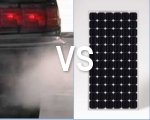The Gillard government is planning a “cash for clunkers” program for Australia, with the cash to come from funding for solar power. Eyes have been on the USA to see how its program fared in reducing carbon emissions. The verdict: not so good.
The USA’s Car Allowance Rebate System (CARS), aka “Cash for Clunkers”, was a $3 billion program to provide incentives to U.S. residents to purchase a new, more fuel-efficient vehicle when trading in a less fuel-efficient vehicle. The aim of the program was two-fold: to act as an economic stimulus and to help reduce carbon emissions.
In July, Prime Minister Julia Gillard announced Australia’s own “cash for clunkers” scheme called the Cleaner Car Rebate should Labor be returned to power. The program will be funded through reductions to existing schemes that target carbon emission reductions, including the Solar Flagships program and Renewable Energy Bonus scheme, to the tune of $370 million.
The hugely popular USA program officially started on July 1, 2009 and ended on August 24. Just over one year later, an analysis of the incentives scheme has found the program had little or no effect.
A study by Atif R. Mian from the University of Berkely and Amir Sufi from the University of Chicago has found that while the cash for clunkers program generated the purchase of an additional 360,000 cars in July and August of 2009, almost all of the additional purchases under the program were sales that were going to occur in the very near future. The effect of the incentive on auto purchases was almost completely reversed as early as seven months after the program ended through a major drop in car sales following the scheme.
As popular as a cash for clunkers scheme may be in Australia, it seems its impact on carbon emissions will be next to nil, particularly given that funding from the program will be taken from solar power. However, there is growing support in industry for an alternative that doesn’t take money away from renewable energy and will actually benefit it – a price on carbon.
Last Friday, Nineteen major Australian energy companies called for a price on carbon to be introduced as soon as possible. The Clean Energy Council has released an open letter to major political parties backed by many of the nation’s top energy companies.












































